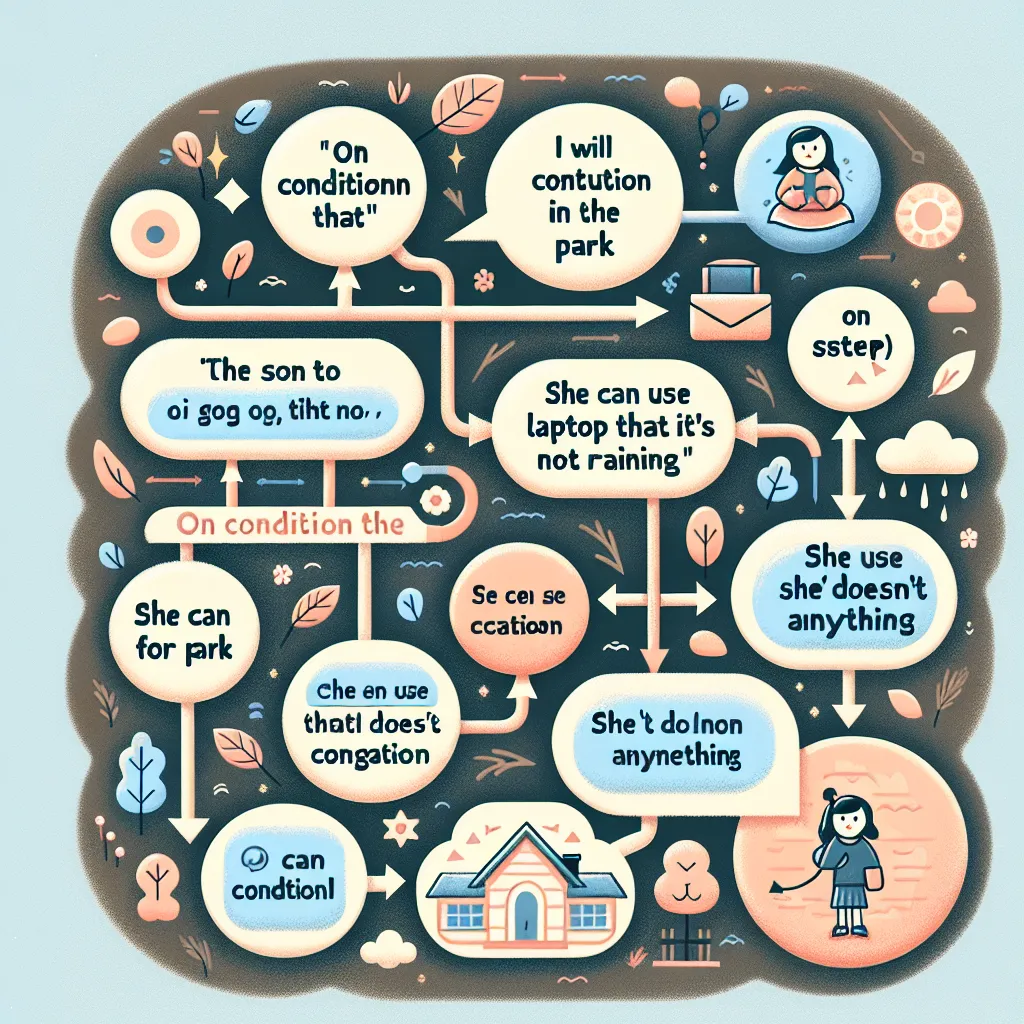The phrase “on condition that” is a useful conditional expression that often appears in IELTS exams. Understanding how to use this structure correctly can help you improve your grammar skills and achieve a higher band score. Let’s explore the meaning, usage, and application of “on condition that” in various IELTS contexts.
Understanding “On Condition That”
“On condition that” is a formal way of expressing a condition that must be met for something else to happen. It is similar in meaning to “if” or “provided that” but tends to be more formal and precise.

Meaning and Usage
“On condition that” introduces a clause that specifies a requirement or condition. The main clause states what will happen if the condition is met. This structure is particularly useful in formal writing and speaking, making it valuable for IELTS candidates aiming for higher band scores.
Examples:
- The company will sign the contract on condition that all terms are agreed upon by next week.
- You can borrow my car on condition that you return it with a full tank of gas.
- The government will provide funding on condition that the project benefits the local community.
Grammar Structure and Formula
The basic structure for using “on condition that” is:
[Main Clause] + on condition that + [Conditional Clause]
It’s important to note that the verb in the conditional clause is usually in the present tense, even when referring to future actions.
Examples:
4. I will attend the meeting on condition that it doesn’t last more than an hour.
5. The scholarship will be awarded on condition that the student maintains a high GPA.
Applying “On Condition That” in IELTS Writing
Using “on condition that” effectively in your IELTS Writing task can demonstrate a high level of grammatical control and vocabulary range.
Task 2 Essay Example
Consider this example for an IELTS Writing Task 2 essay on environmental policies:
“Many countries are implementing stricter environmental regulations. However, some argue that these policies may harm economic growth. In my opinion, environmental protection measures can be beneficial on condition that they are implemented gradually and with consideration for economic factors. For instance, governments could offer tax incentives to companies on condition that they adopt green technologies. This approach would encourage environmental responsibility without causing sudden economic disruption.”
Task 1 Report Example
For a Task 1 report describing a process or system:
“The diagram illustrates a water recycling system for a small community. The system operates effectively on condition that regular maintenance is performed. Water is collected from households and undergoes a filtration process on condition that the initial screening removes large debris. The final stage of purification occurs on condition that all previous steps have been completed successfully.”
Using “On Condition That” in IELTS Speaking
Incorporating “on condition that” in your IELTS Speaking responses can showcase your ability to use complex grammatical structures.
Example response to a question about future plans:
“I’m planning to start my own business next year, on condition that I can secure the necessary funding. I’ve been developing a business plan and networking with potential investors. Of course, I’ll only proceed on condition that the market research shows a strong demand for my product.”
Common Mistakes and How to Avoid Them
When using “on condition that,” be aware of these common errors:
-
Incorrect verb tense: Remember to use the present tense in the conditional clause.
Incorrect: The manager will approve the project on condition that it will meet the budget.
Correct: The manager will approve the project on condition that it meets the budget. -
Confusing with other conditionals: “On condition that” is not interchangeable with “if” in all contexts.
Less formal: If you finish your homework, you can go out.
More formal: You can go out on condition that you finish your homework. -
Overuse: While it’s good to demonstrate this structure, overusing it can make your language sound unnatural.
Alternatives to “On Condition That”
To vary your language and demonstrate flexibility, consider these alternatives:
- Provided that
- As long as
- Assuming that
- Only if
Example:
“The experiment will proceed as long as safety protocols are followed.”
“We’ll expand our operations provided that the market conditions remain favorable.”
Conclusion
Mastering the use of “on condition that” can significantly enhance your performance in the IELTS exam. By incorporating this structure into your writing and speaking, you demonstrate a sophisticated command of English grammar. Remember to practice using it in various contexts and to balance it with other conditional expressions. As you prepare for your IELTS test, look for opportunities to use “on condition that” in practice essays and speaking exercises, always ensuring that the context is appropriate and the usage is natural.